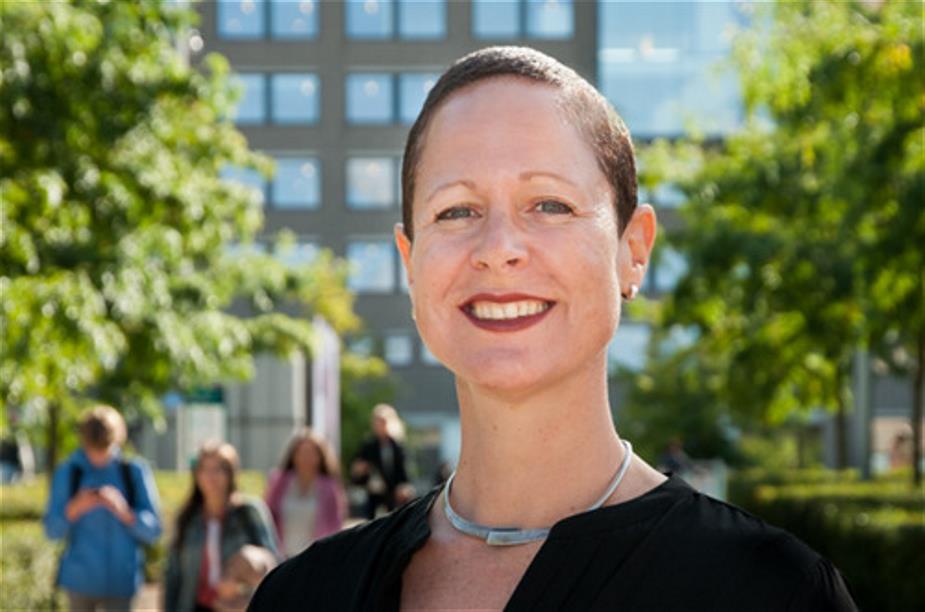“Education is a relationship that you have to work on all the time."
11 March 2021
Since 1 January 2021 Naomi van Stapele (46) is the new professor (lector) Inclusive Education at the Centre of Expertise Global & Inclusive Learning. Naomi has years of experience in education, a passion for inclusivity...

Since 1 January 2021 Naomi van Stapele (46) is the new professor (lector) Inclusive Education at the Centre of Expertise Global & Inclusive Learning. Naomi has years of experience in education, a passion for inclusivity and did a dance of joy when she heard that she had been hired by THUAS. An introduction.
Naomi van Stapele, lector Inclusive Education
"As a student and as a teacher, I went through all layers of education: from primary and secondary education through VMBO and MBO to HBO and finally the university." Her promotion - now six years ago, she finished cum laude. Personal circumstances caused Naomi to come into contact with the theme of inclusion at a young age. "From the time I was 16, I couldn't fall back on my parents. I, along with my twin brother, was on my own. It got me in trouble at school. I also discovered that I was queer. At school, where I hoped to find a listening ear and support, there was no room for my story. I have first-hand experienced the importance of inclusive education. That you see a student as a person with their own story and history, and not just as a cognitive person from which an academic result must come from."
In action
"When I was about 20 years old, I worked as a teacher at a vmbo school in Rotterdam. I was really shocked at the fact that pupils from migrant backgrounds were structurally referred to a lower level of education. I then took action together with students and teachers to help these students move to a higher level. It was very natural for me to work with this. I thought, “This is not possible”. Later Naomi went to the university and also researched this topic during her work for ECHO (Expertise Centre for Diversity Policy). "I received a message the other day from one of the students at the time. He attended the London School of Economics. That's very nice."
Relation
"Education is a relationship that you have to work on all the time. Inclusive education provides the space for students and teachers to learn together and develop knowledge based on what arises between them, without being blocked by assumptions and prejudices. What we see is that education is often taught on the basis of all kinds of assumptions that are fueled by stereotypes from society, public debates. We look too little at the richness of difference with an open and inclusive view, and this creates exclusion. If you do not fall within the white, male, hetero normative norm, or in any other way do not meet dominant standards, you are quickly made a minority, seen and treated as less human. The way in which these stereotypes are reproduced in education has a direct effect on the personal development of these young people. They get the feeling of not belonging, which causes stress with a negative effect on the learning presentations."
Free thoughts
"I think it is important that education is a place where people can think freely, without distinction and with an eye for difference. Difference is an enrichment, it is approaching an issue from different perspectives without exclusion, and with an open mind. Distinction leads to exclusion. I see far too often – intended and unintentionally – that the dominant standard is reproduced. Teachers are sometimes not even aware of this. And that's not just teachers. Students must also be included to think and share inclusively. Inclusive education is a collective process. We all have to do it together and we are all responsible for it."
THUAS
Although Naomi has worked in many other countries, she has pledged her heart to The Hague. "This is my city where I live and which I love. So it's my home." During a study for the municipality of The Hague, she discovered the different facets of the segregation of her city. "Did you know that residents of The Hague Southwest die statistically 13 years earlier than those from the Statenkwartier? Inclusive education plays an important role in re-addressing that segregation. I had already worked with THUAS and a position there was on my bucket list. I did a dance of joy when I heard I'd been hired. And now I'm here."
Plans
Naomi jumps on a moving train when it comes to work. "The common thread in the ongoing projects and in the work of my predecessor Aminata Cairo is that these are student LED. I would very much like to work, to investigate together with students and teachers how we can come together towards a more collaborative way of teaching within THUAS. And I also want to work with those we don't reach. The young people who do have the qualifications for hbo education, but don't get there. What does that say about THUAS? How can we reach them? Young people have their own network with their own mechanisms to support each other. How can we make more use of that peer support? I want to do this research together with young people, not about them but by them and with them. The goal is to come to communities of practice, where young people also inspire others to study at The Hague."